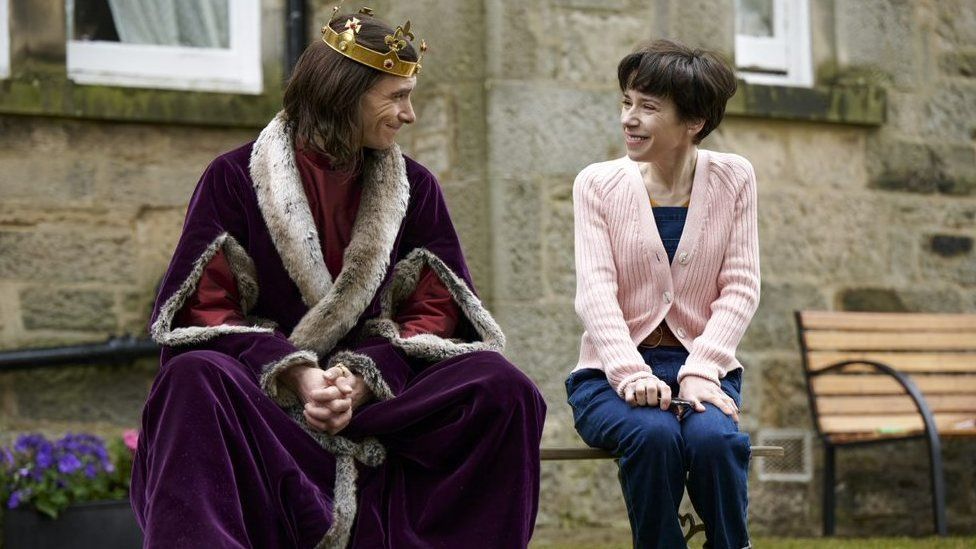The Lost King is a Jubilant Story of Historical Discovery and Overdue Recognition
The New Film From Stephen Frears and Steve Coogan Gives Credit to the Woman Who Found Richard III’s Lost Grave
The plot of The Lost King, the new film written by Steve Coogan and Joe Pope and directed by Stephen Frears, would almost be too unbelievable, too good to be true, if if it didn’t literally happen. The film tells about a middle-aged marketing executive named Philippa who develops a passion for Richard III and grows invested in tracking down his remains, which have been lost to history.
She is told time and time again that a gravesite for the maligned monarch might not even exist, and that many (more qualified) others have tried and failed to locate it. She is constantly assured of failure. But she does not give up. Her research is excellent. And she finds him.
The thing is, the film argues, that if a story about a passionate amateur who makes one of the most important historical discoveries of the last fifty years does in fact feel too contrived or unrealistic or far-fetched for you, then you might need some deprogramming. The Lost King is a clear condemnation of the kind of gatekeeping that governs academic spaces, as well as the psychological frameworks that exist in our own society that result in not taking people (or certain people) seriously.
When the film begins, Philippa Langley (the bewitching Sally Hawkins) is doing her best to carry on amid disappointing, dispiriting circumstances. She has been passed over for a promotion at her Edinburgh firm in favor of younger staffers, she maturely co-parents her two sons with John, the ex-husband who left her (Steve Coogan), and she deals with the debilitating symptoms of her disability, myalgic encephalomyelitis (also known as chronic fatigue syndrome), which most people (including her boss) seem unable to understand is a real medical condition and not simply an excuse for laziness.
She works twice as hard to counteract the days she is physically unable to move her body enough to work, but it does little to counteract the perception of her. As a middle-aged, disabled woman, she must constantly advocate for herself on top of everything else, a necessary and yet demeaning experience as well, since it often results in her being labeled a problem.
A chance viewing of a production of Shakespeare’s Richard III intrigues her, from the opening monologue. Richard, famously hunchbacked, describes his physical appearance in alarmingly deprecating terms. He is “curtail’d of this fair proportion,” “cheated of feature.” He announces, “Deformed, unfinish’d, sent before [his] time into this breathing world / And that so lamely and unfashionable / That dogs bark at me as I halt by them.” He declares that his worthiness (as defined by appearance) is such a foregone conclusion, that he might use it to his advantage. “…therefore, since I cannot prove a lover / To entertain these fair well-spoken days / I am determined to prove a villain.”
Philippa is riveted, but also a bit skeptical of Shakespeare’s interpretation. “I just don’t believe someone would be that wicked because of a disability,” she tells other playgoers. No one really listens.
But Philippa is galvanized to learn more about him, suspecting he has spent the last half-millennium unjustly maligned. Richard died in 1485, while Shakespeare wrote his play in the 1590s. Though others insist that Shakespeare was writing with relative historical accuracy, she notes that he was writing a fictionalized take, more than one hundred years later, after the political regime had already shifted.
She buys a haul of biographies, and joins a local chapter of the Richard III society, a group of historically-minded eccentrics who routinely meet at a hotel bar to talk about the Plantagenets and the War of the Roses, the conflict between the houses of York and Lancaster that made Richard King and then ultimately led to his murder at the age of 32.
Richard has long been categorized as a usurper (including on the Royal website), but there isn’t enough evidence to support this. There isn’t even, she learns, any evidence beyond Shakespeare’s play that he murdered his way to the throne. (This is important, because in the play, he kills his two little nephews!)
That Philippa begins to believe Richard was innocent of the historical crimes ascribed to him by the new, rival regime is only spurred by the fact that she starts having visions of him. Philippa casually hallucinates Richard, who looks like the young actor who played him onstage (Harry Lloyd). He becomes a kind of friend as her enthusiastic, intellectual investment grows into a highly personal one.
She is extremely invested in clearing his name, and, when she learns that the location of his remains is unknown (local history suggests that they were thrown into a river, but he might have also been buried), she begins to research where they could be. Finding his bones would go a long way towards interpreting how he actually functioned in history, conferring legitimacy to a figure who has remained illegitimate in the public opinion for 500 years.
Despite her growing expertise and tremendous (archival) research, she is dismissed for being an amateur historian, nearly laughed out of some spaces for her extreme lack of academic credentials. When she contacts the archaeology department of Leicester University, located near the probably burial site, about funding a dig to search for (and ultimate exhume) Richard’s bones, as well as university and local officials about funding this obviously-important effort, she is initially dismissed for her enthusiasm about the subject and amateur status.
Furthermore, she is guided not only by her tremendous research, but also a sense of intuition; she says that she has a feeling that she has identified the correct spot. But her eagerness and earnestness become tools for these parties to dismiss her even more; “a feeling is what you get when you sit on a bus seat that’s still warm,” a Leicester University official (a very weaselly Lee Ingleby) responds.
Refusing to admit defeat, Philippa establishes the Looking for Richard Project, which crowdfunds the purse to finance the excavation. After it seems like she has been right all along, it is Leicester University (and this very man) who swoop in to take all the credit for what she has accomplished. The film has a lot to say about both the pretentiousness of academia and the corporate true-colors of Universities, that any graduate students in the audience might have to keep themselves from whooping at the screen.
The Lost King is a rich, heartrending film on its own—but is made into something transcendent not only by the fact that it purports to tell a true story, but also that it exists to restore rightful credit where credit is due. This is a story about what Philippa Langley has accomplished, against all odds—and how she remained committed and indefatigable despite the constant disparagement and ultimate exclusion from her own work.
The film is clear about the parallels between Philippa and Richard, especially where their identities have become excuses for society to belittle or denigrate them, but it also aligns its whole mission with Philippa’s—this film promises historical illumination amid a sea of dismissive fiction. But it is not only worthy because of its commitment to this real person, who, when she did find the bones of Richard III in the very spot she predicted she would (in 2012), made one of the most important historical discoveries in the Western tradition.
The Lost King is a rich, vibrant film, beautifully designed (from Rhona Russell’s winsome costuming to production design work that takes advantage of the beauty of the old cities of Leicester and Edinburgh) and featuring a stirring score from Alexandre Desplat. Coogan and Pope’s expressive script is similarly splendid—triumphant without seeming forced, wholeherated without being cloying. On a surface level, it pulls off memorable rhetorical flourishes without seeming presentational, but even more impressive is how it constructs its heroine. The script is an empathetic one (shading in a lot of humanity to a host of minor characters), but its crowning achievement is its characterization of Philippa, which is a bit of a high-wire act after it gives her a recurring hallucination of a long-dead king. She never once seems crazy, never once seems under-qualified, never is too much of a romantic or a fantasist or a sentimentalist.
The script balances her intellectual and emotional natures, representing her as unendingly formidable and very brave. It is also clear about how Philippa’s lack of an academic history prevents her from the rote thinking or jadedness that one might have after years in the grind; we recognize that she is a breath of fresh air to this wheezing system, even if if strains itself not to inhale.
Much of the specialness of this character has to do with her performance by Sally Hawkins, an actor of profound sincerity and subtle elegance. She brings Philippa to such swelling, full-hearted gumption without compromising her keenness, swiftness, resourcefulness. Perhaps the film’s most lovely scenes are the ones where she speaks to the quiet apparition of Richard—loving, faithful, ever-genuine.
The Lost King is ultimately a jubilant film, because it keeps its eyes on Philippa rather than become distracted by the petty tyrannies of the contemporary University, or its obvious links to hegemonic systems in general.
Still, amid everything else, it reminds that—in the court and on the campus—the underdog rarely does win. Powerful institutions will do everything they can to refuse credit to parties it deems inconvenient (which includes middle-aged women, outsiders without institutional association, and disabled people).
If the story of The Lost King would seem unlikely without its factual context, then we must ask ourselves what about it provides this coloring, and why we are conditioned to believe that is the case. History is written by the winners, and false narratives are easily adopted and promoted by the careless and the ignorant. Which is why, the film reminds us, we need historians—ones who care.




















